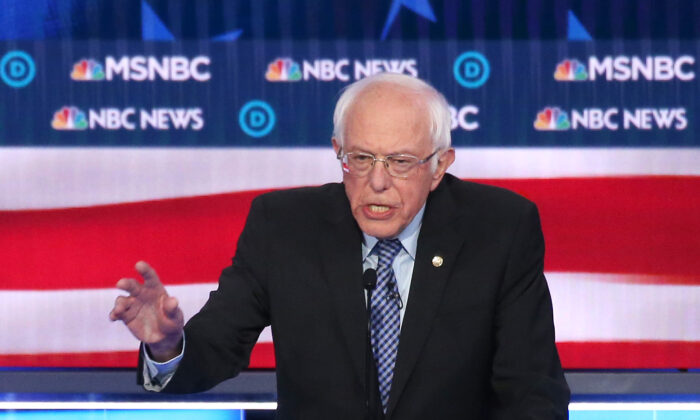‘Unhealthy Partisanship’: Move Afoot to Improve the Workings of Parliament
Sen. Bernie Sanders (I-Vt.) was the only Democratic presidential candidate at the debate on Wednesday night to express support for idea that the candidate who has the plurality of votes heading into the Democratic National Convention should automatically get the nomination.
With eight candidates still in the Democratic primary race, there’s “a very good chance that none of you are going to have enough delegates” going into the convention to clinch the nomination, moderator Chuck Todd of NBC told the six candidates on stage. He asked them if the candidate with the most delegates should get the nomination even if they don’t have a majority of the delegates.
Former New York City Mayor Michael Bloomberg, 78, said that “the process” outlined by the Democratic Party should take place. The process would be a brokered convention that features additional rounds of voting by both delegates and superdelegates.
“Let the process work its way out,” former Vice President Joe Biden, 77, added.
Sen. Elizabeth Warren (D-Mass.), 70; Sen. Amy Klobuchar (D-Minn.), 59; and former South Bend Mayor Pete Buttigieg, 38, also said they support a brokered convention.
Sanders said he does not.
“The process includes 500 superdelegates on the second ballot. So I think that the will of the people should prevail, yes,” Sanders said, drawing applause from the audience.
“The person who has the most votes should become the nominee,” he added.
 Democratic presidential candidates (L-R) former New York City Mayor Mike Bloomberg, Sen. Elizabeth Warren (D-Mass.), Sen. Bernie Sanders (I-Vt.), former Vice President Joe Biden, former South Bend, Indiana Mayor Pete Buttigieg, and Sen. Amy Klobuchar (D-Minn.) participate in the Democratic presidential primary debate at Paris Las Vegas in Las Vegas, Nevada on Feb. 19, 2020. (Mario Tama/Getty Images)
Democratic presidential candidates (L-R) former New York City Mayor Mike Bloomberg, Sen. Elizabeth Warren (D-Mass.), Sen. Bernie Sanders (I-Vt.), former Vice President Joe Biden, former South Bend, Indiana Mayor Pete Buttigieg, and Sen. Amy Klobuchar (D-Minn.) participate in the Democratic presidential primary debate at Paris Las Vegas in Las Vegas, Nevada on Feb. 19, 2020. (Mario Tama/Getty Images)Superdelegates are automatic delegates from each state. They’re typically lawmakers. They cannot vote on the first ballot but can get involved if a contested convention takes place at the convention in Milwaukee in July.
Results from the two early voting states of Iowa and New Hampshire show Buttigieg with 22 delegates, including a disputed delegate from Iowa that could shift to Sanders after a recount, and Sanders with 21.
Warren has eight, Klobuchar has seven, and Biden has six. Bloomberg is ignoring the early voting states and focusing on states where voters will head to the polls on March 3, including California, Texas, and Maine.
Former Senate Majority Leader Harry Reid (D-Nev.) said before the debate that a brokered convention should take place if no candidate gets the majority of delegates required to win.
“No, I think that we should make sure that the convention picks the nominee then,” he told the Associated Press.
“We’ve had brokered conventions before, and we’ve always come up with good candidates. It’s not the end of the world. It just slows the process down.”
Former Democratic presidential nominee and Secretary of State John Kerry weighed in early Thursday during an appearance on CNN, arguing that party rules clearly state there should be a second round of voting if no candidates earn a majority of delegates.
“Those are the rules. That’s exactly how democracy works,” Kerry, a Biden supporter, said. “When you become a candidate for president of the United States, you know what the rules are. And if you’re going to be a good president, you need to play by the rules, something that Donald Trump doesn’t do.”
Sanders, Kerry noted, argued for a period of time at the end of the 2016 primary that superdelegates should choose him over Hillary Clinton, who became the Democratic nominee before losing to Trump.
This article is from the Internet:Sanders Pushes for Nominee With Most Votes to Get Democratic Nomination
